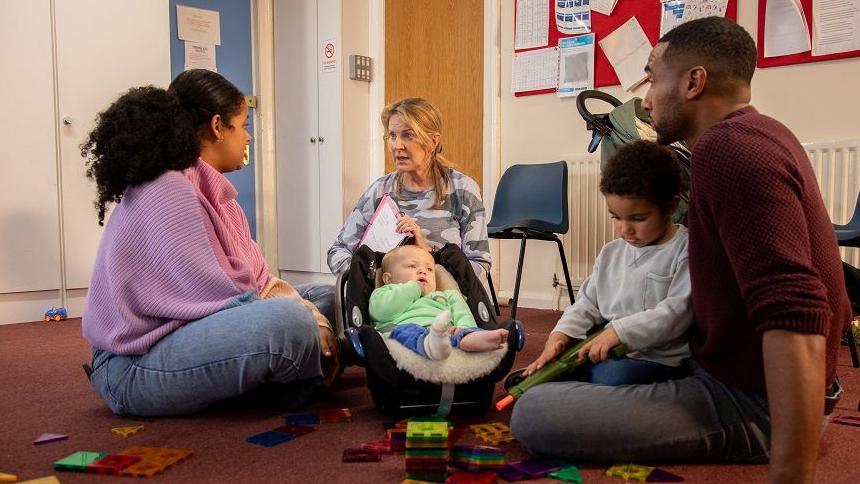Families not getting enough help before crisis point, charities warn

- Published
The number of children in residential care in England has more than doubled over the past 12 years, with charities saying families are not getting help before they reach crisis point.
A coalition of five children’s charities say the increase is in part a consequence of wider issues, such as rising levels of child poverty.
And part of the problem is spending cuts to local services designed to help children before problems escalate, says the report, seen by the BBC.
The government said it was “devastating” that children were “being let down” and its Children’s Wellbeing Bill would “make sure every child" had a "safe, loving home”.
The report has been put together by five charities - Action for Children, Barnardo’s, The Children’s Society, National Children’s Bureau and the NSPCC.
Together they are calling for the government to invest more in “early intervention services” for children and young people.
Early intervention services – like children’s centres or family hubs – are provided by local councils and aimed at parents and children who may be facing problems, or to support children in the community.
The report found that since 2010/11 the amount councils in England spent on early intervention services almost halved – from £4bn to £2.2bn in 2022/23.
The charities say this is “likely” to have played a part in the increase in the number of children in care, as services to help people with low-level needs “have become increasingly hard to find”.
Meanwhile in the same time period, the amount spent on “late intervention” services for children and young people – such as residential care, youth justice and child protection – has hit a record level, increasing from £6.3bn to £9.9bn.
The amount spent on placements in children’s homes specifically almost doubled to £2.4bn.
But the report says this increase in expenditure “is not leading to improved outcomes for the children and families the system support”.
And the number of children in residential care rose from 8,000 in 2011 to 16,000 in 2023.
‘Vicious cycle’
The report also quoted the Competition and Markets Authority as saying the way that children’s social care was currently being funded was “dysfunctional”, with “unexpectedly high profits” being made and lack of suitable placements.
Lynn Perry, CEO of Barnardo’s, described it as a "vicious cycle”.
“We are stuck in a vicious cycle, with less and less support for children and families, just as rising poverty and poor mental health mean they are needed more than ever before.
The only answer must be additional investment in services that help to prevent these crises in the first place.”
Cllr Arooj Shah, chair of the Local Government Association’s Children and Young People Board, said councils “stand ready” to address the challenges, but need “long-term, adequate funding” to do so.
'I was thrown in a children's home and cast aside'
- Published25 August 2024
Austerity contributing to rise in kids in care - judge
- Published29 January 2024
In December 2022, an independent review of children’s social care highlighted a system that was “increasingly skewed to crisis intervention.”
The review author, Josh Macalister, is now a Labour MP. He described Monday's report as “the latest in a long line of reports that all show the same trend”.
“We have the plan, evidence and workforce to reform the care system," he said. "The last government made modest changes but we need the full scale reform programme that children and families deserve.”
The charities say the government's Children's Wellbeing Bill does not amount to the scale of reform that is required, describing this as a “serious concern”.
“The new government has not committed to the widescale reform of the sector that is required, nor has it pledged any increase in funding for family help services, despite this being a central recommendation of the independent review of children’s social care in England. For many, the lack of such a commitment is a serious concern.”
In response to the report, the minister for children and families, Janet Daby, said: “It is devastating that young people are being let down by a system that should be keeping them safe.
“We know that all too often care placements for vulnerable children come at a massive financial cost to councils and a human cost to young people who aren’t getting the support they need.”
Ms Daby said the government was "committed to cracking down on providers making excessive profits" and the Children's Wellbeing Bill would "strengthen regulation".
Get in touch
Are you affected by issues covered in this story? Share your experiences.